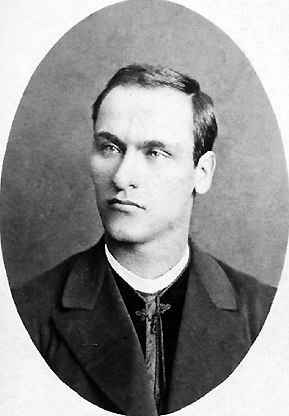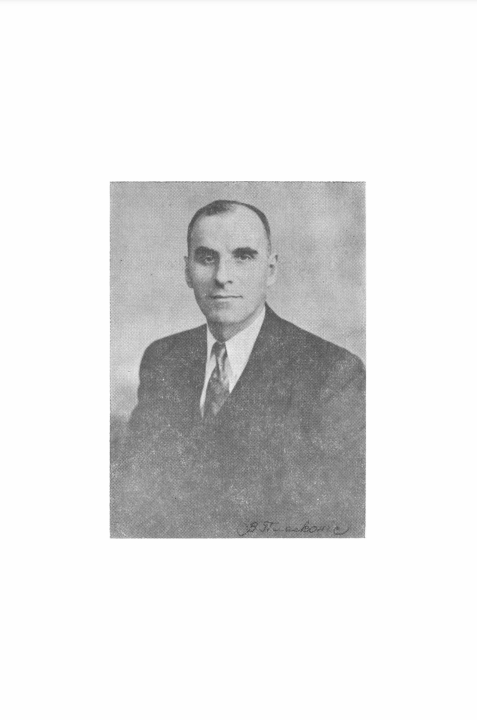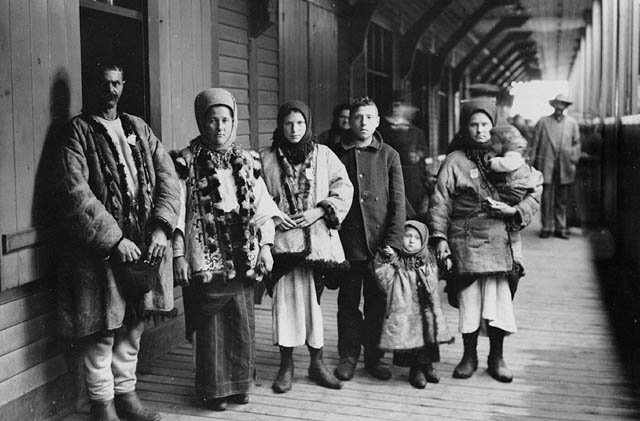Finally, the day came for me to leave. Uncle Moyshe Loker was traveling to Vienna, so we went to Vienna together. An hour before we were supposed to leave for the train station, the tailor who made Keyle’s wedding clothes appeared and said that he was owed another ten guldens that Hirsh Loker did not want to pay. He said that Binyomen should pay. And here came the coach that was to carry us to the train station! In short, I paid him the ten guldens and we got in—Uncle Moyshe, Keyle, and my sister. I said goodbye to everyone and adieu to Kalush.
When someone leaves his native city, he leaves behind so many joys of youth, so many sweet and heartfelt memories, that he brings his memories along with him so that he can recall them joyfully. But what kinds of youthful memories did I bring with me? Kalush gave me nothing. No education. No one bothered with a poor orphan. Many Jewish orphans wandered in the streets in tatters, half naked, and the respectable Jews did not even want to take notice. They were immersed in themselves. And yet, I felt a longing upon leaving my native town.
The train arrived. I said goodbye to my Keyle, and held her tight, thinking, Who knows when I will be able to hold you in my arms again? I said goodbye to my sister, who cried bitterly. I cried along with her. She handed me a package with cookies that she had baked for me. Then Uncle Moyshe and I boarded the train. I saw Keyle and my sister standing and watching the train fly further and further away. My eyes followed them through the window. I thought to myself, Poor sister. Will you be able to get along without me? May God help you.
We arrived in Vienna. Gedalye, Uncle Moyshe’s son, was waiting for us at the train. We went to Yankev Fridlender, who was actually an in-law of the Lokers. He was a broker here, in whatever allowed him to earn a gulden. I knew that it was not going very well for him. At dinnertime, I was sitting by the window and they were bringing pierogi with cherries to the table. Everyone in the household sat down around the table and started to eat. They did not invite me to eat with them, so I took out my pack and had a bite. To this day, I cannot explain why they did not invite me to eat with them. Anyway, uncle could not do anything. He was a guest himself. But the Fridlenders were, after all, cultured people. They understood the etiquette very well, of course. Impossible to understand.
Evening. Uncle slept there. I went to a hotel not far away, paid seventy kreuzers, and went to sleep.
The next day we went to the shipping company to buy a ship’s ticket for me. At the entrance, I read, “Holland-American Shipping Company.” Now I had the ship’s ticket in my pocket. That night, I did sleep at the Fridlenders’ home. Uncle later told me that he (Fridlender) had gotten a broker’s fee of three guldens. The next day, the train took me to Germany and from there to Rotterdam, Holland. I waited a day in Leipzig until I could board a train for the Dutch border.
When I arrived at the border, a tall gendarme boarded the train and shouted, “Alle heraus, everyone out!” Well, we all got out. They lined us up. Now another official with polite manners came up to me first. He asked me, “Wo ist ihre Zeugnis? Where is your certificate?” My head started to spin. What should I show him? My ship’s ticket? He did not ask me for a passport, but for a certificate. He saw from my face that I was scared. He said, very politely, “Schrecken sie sich nicht. Don’t be afraid. Show me what you have.” I took out the envelope with my ship’s ticket. With a smile, he took a look and shouted out, “Correct. To the station!” I got back on the train. So, he was the shipping company’s person!
In Rotterdam, I waited a day for my ship to depart. It was Sunday, June 30. I boarded the ship. During the first day and part of the second day, I did not feel bad. But later, up to almost the last day on the ship, I was seasick and ate almost nothing.
They brought us to Castle Garden. I expected that my brother-in-law Motl would come to pick me up. When my turn arrived, the officials asked me how much money I had. I showed the sixty guldens (about twenty-four dollars). They asked me if anyone was coming to pick me up. I said that I expected my brother-in-law to come.
An official turned to an officer and told him to ask me the street and the address. I said, “179 Eldridge Street.” He told them to show me where the ferry was and they took me and showed me. I took my suitcase and went out. I saw many people going to the ferry. I followed them. On the ferry I recognized a Jew and asked him how to get to Eldridge Street. He told me that he would put me on the right streetcar himself and wrote on a piece of paper for me to show the conductor. The conductor let me off at Grand Street and showed me which way to go.
Here was Eldridge Street. Then I saw my number, 179 Eldridge Street, second floor. I entered the apartment. My brother-in-law Motl was getting ready to go pick me up at Castle Garden. He had just come from work, where he was a presser of skirts. He had not been able to leave the shop any earlier. I had been traveling on the ship for seventeen days and had been seasick almost until the last day.
I arrived in this blessed country on Tuesday, July 15, 1896. Grover Cleveland was then the president. It was an election year. McKinley was running for the Republicans. Their principle was the protective tariff. The brilliant orator and then liberal, William Jennings Bryan, was running for the Democrats on the issue of free trade and free silver at 16 to 1. And a lively campaign it was!
I arrived in New York in the midst of that lively whirl. Motl and I stayed with a landsman,* Yitskhok Hammer, and his wife Khanetshe. At home, he had been an inspector for Leybtshe Shpindel, serving as a guard in a distillery. In America, his children had become good tailors in a couple of years and had brought over their parents. They bought him a soda stand on Essex Street, which did not even earn him peanuts. So they kept boarders. Six of us slept in one room. We paid three dollars a month with laundry, and one dollar thirty a week for supper. That’s how people lived in those days. Nevertheless, they lived a happy life. People went to the theater, to social gatherings, and to various meetings.
Yes, life then was truly interesting. The first couple of days after my arrival, my brother-in-law Motl took me to street meetings to hear various speakers about the election campaign. Suddenly, I heard a Yiddish speaker speaking from another corner of Suffolk and Rivington streets. A young man was standing on a box and speaking full of enthusiasm. I pushed through the crowd to be closer to the speaker. He was a tall young man, with one eye that looked a little bit upward. It was the first secretary of the United Hebrew Trades, Bernard Weinstein. I had never heard such words in my town: “Worker freedom You toil bitterly in the sweatshops and your children go naked and barefoot. . . . Social, political, and economic equality and security.” He urged the listeners to come to the Socialist club on Ludlow Street in the evening; there would be good speakers there.
It was the first time in my life I had heard the word “Socialist.” Excited by the speaker, I went home to sleep. As I lay on my bed, my mind worked over the speech that I had just heard: “Work should be based on justice and right. . . . Your children go around in the street barefoot and naked. . . .” And I began to think about my town, Kalush, and about the leaders of the community. Why didn’t they take an interest in the children and build a talmud torah,* or some other social improvement for poor children? They sit over the Gemara and move their lips, and they do not put into effect a single word of what they study. Do they not study in Tractate Nedarim the passage, “Hizharu bivney aniim shemeyhem teytsey Toroh”? And, if they do not believe in what they are studying, how can they sit over the Gemara and simply babble on? With these and similar thoughts, I fell asleep.
The next day, I got addresses of tinsmith, sheet metal, and copper-brass shops. I went to Brooklyn, where they took my name in the shops and said that they would let me know. Friday, the third day after my arrival, I went to try my luck in New York, going from one shop to the next. I entered Fulton Street and saw a sign: Lamps and sheet metal work on the third floor. I went up and a sturdily built man in overalls was sitting not far from the entrance. He was a Jew. I asked him if he needed a tinsmith. He asked me where I had worked before, putting me into an uncomfortable position. He awaited my answer. Since I had some addresses from Brooklyn I responded, “On McKibben Street, Brooklyn.” He brought me over to the workers, also Jewish, showed me work that they were doing, and asked whether I could do the work. I answered, “Yes.”
“But remember, this is very particular work.”
“Absolutely,” I answered, “I will do the work. You’ll see, you’ll be happy.”
He wrote down my name and told me to come on Monday. I ran home and told Motl that I had gotten work.
In the evening, I went to hear the street meetings. Some of the speakers attacked religion. Even the good-hearted Max Pine threw in a couple words criticizing religion.31 I did not like that. I thought to myself, mixing anti-religion together with social and economic justice leaves behind the same taste as a slap instead of a Sabbath greeting.





Автобіографія була надіслана на конкурс мігрантських автобіографій, організований єврейським інститутом YIVO. Її автор – Бен Рейсман з галицького містечка Калуша, який згадує своє дитинство у Галичині, приїзд до Америки у 1896 році і заангажування у соціалістичний рух. Обраний уривок показує процес подорожі і важливість мережі соціальних контактів поміж мігрантами з одного регіону. Такі зв’язки уможливлювали і полегшували прийняття рішення про міграцію, пошуки роботи, адаптацію на новому місці. Одним з характерних моментів залученості на новому місці є інтерес до політики. Бен Рейсман прибув до Штатів у період передвиборчої президентської кампанії і з перших днів долучився до мітингів. Соціалістичні гасла про нерівність допомагають йому переосмислити свій галицький досвід перед еміграцією. Водночас, важливим для Бена є збереження своєї єврейської ідентичності.